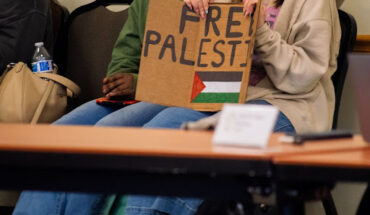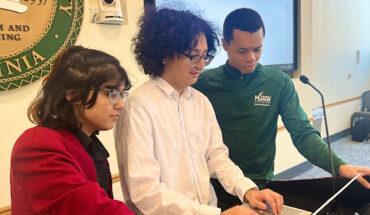(Photo credit: Astacia Pegram/Fourth Estate)
On the night of Oct. 14, a group of students came together to ask, “Right, Wrong or Different?” The theme of this semester’s discussion was the ethical issues surrounding the global treatment of displaced populations, commonly referred to as refugees.
The dialogue was sponsored by the Office of International Programs and Services (OIPS) and the Leadership Education and Development (LEAD) Office, and facilitated by New Century College and School of Conflict Analysis and Resolution professor Al Fuertes. This is the fifth “Right, Wrong or Different?” program that Mason has hosted, with past topics ranging from substance abuse and gender identity to policy-community relations.
Before the event began, students milled around the array of international snacks and drinks and found seats among strangers at the round tables set up in the middle of the room. Anna Ritter, a philosophy major, recounted to her group how a series published on the Humans of New York Facebook page motivated her to learn more about the Syrian refugee crisis, and ultimately, to attend this event.
The session began with group discussions during which participants were encouraged to be open-minded and respectful, followed by a “four-corners” activity that led students to assess their own views on migration and talk with new people. A lecture by Professor Fuertes followed the activity.
Fuertes has been working with displaced populations around the world for the past twelve years. His presentation weaved together statistics, definitions, visuals and personal anecdotes about meeting displaced people and seeing firsthand how quickly their lives had changed. Fuertes projected pictures and videos of displaced Syrians that have been circulating the daily news cycle, but he also shared stories of the displaced populations of Myanmar, South Sudan, Burundi, Iraq and more.
Ritter was shocked, she said, during his presentation.
“What really stood out to me was his passion for helping these people. When he started talking about all those people living there and all those numbers—those are his friends. It made it so much more real for me, at least,” she said.
Fuertes explained to the group why knowledge of global displacement is so limited and why the U.S. population is slow to react. “What we hear on social media is sifted,” Fuertes said. “Why bother? We are not interested. What can we get out of it?”
Fuertes also taught the group about the legal differences between refugees, asylum seekers, internally displaced and stateless people, as defined by the United Nations High Commissioner for Refugees (UNHCR). He talked about how difficult it can be for displaced people to navigate the process without money or legal aid. Fuertes then introduced the concept of the smuggler industry, a “multimillion dollar business” that facilitates the often unsafe transport of people fleeing their home countries for a high price, which he compared to human trafficking. He also touched on displacement caused by nonviolent phenomena such as climate change, which affects island populations in Eastern Asia.
His goal, Fuertes said, was that participants leave the event “with a new perspective of looking at displacement.” Students who want to help at refugee camps, he said, should also want to learn from the people.
Although the LEAD and OIPS offices partner up to host a “Right, Wrong or Different” program every semester, Nick Lennon, director of the Leadership Education and Development Office, said directors chose the topic of refugees and displacement because of its relevancy and urgency. According to a report published by the UNHCR in June, the number of forcibly displaced people reached 59.5 million at the end of last year.
“I had no idea,” said Ritter after learning about the number of displaced populations all over the world. What surprised her the most, she said, was hearing that the United States has taken in only about 1,600 displaced Syrians. “It was astonishing and embarrassing and I am ashamed.”
The group was not able to decide on a singular, concrete response on the right answer when dealing with displaced populations, although they did leave the room with the names of student organizations, study abroad programs and internships that can help them learn more about the causes and consequences of displacement.
“Going to events like this reassures me that I am studying the right thing,” said Ritter. “Right and wrong are not as simple as you might think, but they still exist.”




